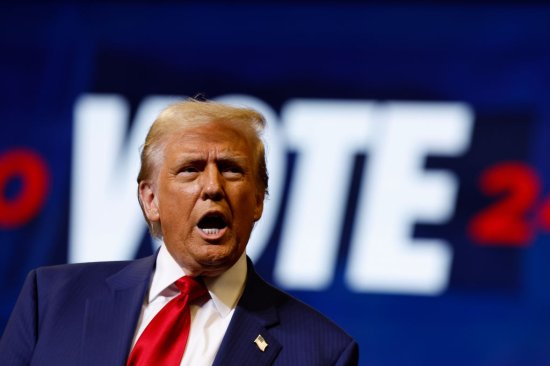
The former President is again sowing doubt in the integrity of the elections
For months, Donald Trump has projected confidence on the campaign trail that he’s poised to defeat Vice President Kamala Harris. But with less than a week until Election Day, he’s planting the seeds to say the election was stolen if he loses.
The former President has ramped up his rhetoric this week to sow doubt in the integrity of the outcome, particularly in the pivotal battleground of Pennsylvania, where Trump and Harris are essentially tied in the polls. He held a press conference Tuesday at Mar-a-Lago, saying there were “some bad spots in Pennsylvania where some serious things have been caught or are in the process of being caught.” On social media, he claimed that York County had received “THOUSANDS of potentially FRAUDULENT Voter Registration Forms and Mail-In Ballot Applications from a third party group.” Lancaster County, he added, had been “caught with 2600 Fake Ballots and Forms.” On Wednesday, his campaign sued Bucks County, outside of Philadelphia, for allegedly turning away Trump voters from submitting mail ballot applications. “Pennsylvania is cheating, and getting caught, at large scales rarely seen before,” he posted on Truth Social.
[time-brightcove not-tgx=”true”]That’s not an accurate characterization of the facts. York County officials confirmed a suspicious delivery of election-related materials, including voter registration forms and mail-in ballot applications, to the county office, but set it aside for examination. Lancaster County law enforcement and election officials also confirmed “incidents of suspected voter registration fraud” likely stemming from a “large-scale canvassing operation,” they said, setting in motion a probe. It is not yet known which organizations submitted the election materials—or which candidate they’re supporting. Either way, election experts say, the incidents prove the opposite of Pennsylvania officials cheating. Rather, they show they’re successfully preventing election mischief.
“The system is working in this case,” says Tammy Patrick, who directs the National Association of Elections Officials, “because the registration applications that were submitted that were questionable were isolated and are being investigated.”
Bucks County officials also pushed back on GOP claims, spread widely on social media, that Trump supporters were prevented from applying for mail-in ballots Tuesday in a jurisdiction evenly split among registered Democrats and Republicans. But it acknowledged a “miscommunication” earlier in the day. Many voters, they said, thought they were in line to vote in person, rather than to apply for a mail ballot, which they could either fill out and submit on the spot or return before Election Day. Videos show that officials at one location sought to divide a long line and told people they would not be able to cast ballots, creating confusion among some voters. Clips of the ordeal were amplified by right-wing influencers including billionaire Elon Musk, who has more than 200 million followers on X, formerly known as Twitter, triggering a torrent of online outrage. On Wednesday, a Pennsylvania court sided with the Trump campaign’s lawsuit, issuing an injunction that extends the deadline to apply for mail ballots in Bucks County until Friday.
Harris campaign spokesperson Ian Sams mocked Trump’s cheating allegations on Wednesday, posting a screenshot on X of one of his social media posts. “This is not what someone posts if they are actually confident about their standing in Pennsylvania,” Sams wrote.
The melee is a sign of the high-stakes race in Pennsylvania, which could ultimately decide the election, and the extent to which Trump and his allies are laying the groundwork to contest the outcome there if he falls short. The former President holds less than a half percentage point lead in the current 538 average of state surveys, and many pundits say he needs to clinch the Keystone State to win the Electoral College.
In 2020, President Joe Biden won Pennsylvania by less than one percentage point. Now, a network of pro-Trump organizations is pouring millions into the commonwealth to increase GOP turnout. In the final stretch of the election, Musk has donated more than $118 million to his political action committee, America PAC, to encourage low-to-mid propensity Trump supporters to vote early in the critical swing state.
Read more: Across Pennsylvania, Musk Deploys His Fame and Fortune For Trump
The effort marks a departure for Republicans from four years ago, when Trump told his followers to vote on Election Day and eschew mail voting, a system he maligned as rife with fraud. This time, Trump’s top campaign lieutenants convinced him that it was self-defeating to rip early voting, because it allowed the opposition to gain a competitive advantage while discouraging his backers from voting at all.
While the Trump camp, along with allied groups, has built an infrastructure to avoid repeating the same mistake, critics say his preemptive complaints of “cheating” are following a familiar playbook. “This is simply a replay of 2016, when he said that Ted Cruz’s victory in the Iowa caucuses was due to fraud, and 2020 when he said that Joe Biden’s victory in the presidential race was due to fraud,” says Whit Ayres, a veteran Republican strategist. “It’s par for the course.”